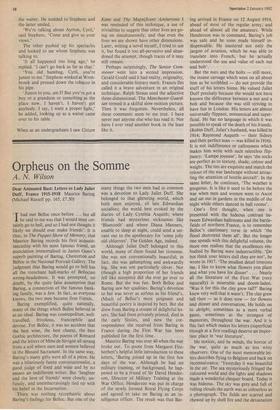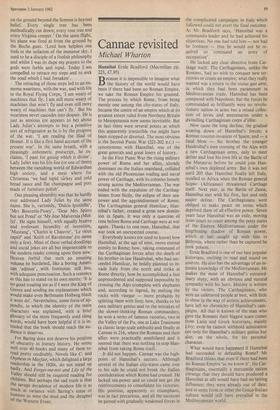Orpheus on the Somme
A. N. Wilson
Dear Animated Bust: Letters to Lady Juliet Duff, France 1915-1918 Maurice Baring (Michael Russell pp. 165, £7.50)
4 had met Belloc once before ... but all I he said to me was that I would most cer- tainly go to hell, and so I had not thought it likely we should ever make friends'. It is thus, in The Puppet-Show of Memory, that Maurice Baring records his first acquain- tanceship with his most famous friend, an association immortalised in James Gunn's superb painting of Baring, Chesterton and Belloc in the National Portrait Gallery. The judgment that Baring would go to hell has all the trenchant hall-marks of Bellocian wrong-headedness. It was prompted, no doubt, by the quite false assumption that Baring, a connection of the famous bank- ing family, was a Jew. In fact, as everyone knows, the two men became firm friends.
Baring exemplified, quite naturally, many of the things which Belloc believed in as an ideal. Baring was cosmopolitan, well- travelled, frivolous, francophile and devout. For Belloc, it was no accident that the best wine, the best cheese, the best Gothic architecture, the poems of Ronsard and the letters of Mme de Sevigne all sprang from a soil where men and women believed in the Blessed Sacrament. In the same way, Baring's many gifts were all of a piece. He was a hilariously funny conversationalist, a good judge of food and wine and by no means an indifferent writer. But `laughter and the love of friends' were closely, un- fussily, and unembarrassingly tied up with his belief in the Incarnation.
There was nothing sycophantic about Baring's feelings for Belloc. But one of the many things the two men had in common was a devotion to Lady Juliet Duff. She belonged to that glittering world, which both men enjoyed, of late Edwardian socialites; the world best evoked by the diaries of Lady Cynthia Asquith; where friends had mysterious nicknames like `Bluetooth' and where Diana Manners, unable to sleep at night, could send a ser- vant out to the apothecary for 'some jolly old chlorrers'. The Golden Age, indeed.
Although Juliet Duff belonged to this world, many of them found her tiresome. She was not conventionally beautiful; in fact, she was galumphing and awkwardly big. She was not particularly clever. Nor (though a high proportion of her friends fell like ninepins) did she ever go over to Rome. But she was fun. Both Belloc and Baring saw her qualities. Baring's devotion to her was never as serious as his friend's. (Much of Belloc's most poignant and beautiful poetry is inspired by her). But she drew from Baring a stream of delightful let- ters. She had them privately printed, died in the early Sixties, and now the cor- respondence she received from Baring in France during the First War has been published for the first time.
Maurice Baring was over 40 when the war broke out. To quote from Margaret Fitz- herbert's helpful little introduction to these letters, `Baring joined up in the first few days of the war. Although he had no military training, or background, he hap- pened to be a friend of Sir David Hender- son, Director of Military Training at the War Office. Henderson was put in charge of the newly formed Royal Flying Corps and agreed to take on Baring as an in- telligence officer. The result was that Bar-
ing arrived in France on 12 August 1914, ahead of most of the regular army, and ahead of almost all the amateurs. While Henderson was in command, Baring's job was safe and he soon made himself in- dispensable. He mastered not only the jargon of aviation, which he was able to translate into French, but he actually understood the use and value of each nut and bolt'.
But the nuts and the bolts — still more, the insane carnage which went on all about him as he scribbled — do not provide the stuff of his letters home. He valued Juliet Duff precisely because she would not have known the difference between a nut and a bolt and because she was still striving to have fun in London. His letters are almost universally flippant, nonsensical and super- ficial. He has no language in which it was possible to speak of the death of his friends. (Robin Duff, Juliet's husband, was killed in 1914; Raymond Asquith — their Sidney and their perfect man — was killed in 1916). It is not indifference or callousness which makes him write with such relentless flip- pancy. 'Lampe joyeuse', he says 'the socks are perfect as to texture, shade, colour and weight. The ties are exquisite and match the colour of the war landscape without attrac- ting the attention of hostile aircraft'. In the same letter, he continues, `The weather is gorgeous. It is like it used to be before the war when men and women went to Ascot and sat out in gardens in the middle of the night while others danced in ball rooms'.
One's first thought, when one is presented with the hideous contrast be- tween Edwardian ballrooms and the battle- fields of northern France, is to remember Belloc's cautionary verse in which `the flood destroyed them all'. But the longer one spends with this delightful volume, the more one realises that the excellences em- bodied by Baring were indestructible. `Do not think your letters dull they are not', he wrote in 1917. `The smallest detail interests me. I like to know what flowers you plant and what you have for dinner' .... Nearly all the literature of the First War (very naturally) is miserable and doom-laden. `Was it for this the clay grew tall?' Baring knew very well that it wasn't. The clay grew tall then — as it does now — for flowers and dinner and conversation. He holds on to delight, sometimes as a mere verbal game, sometimes as the strongest of memories, throughout the war. And it is this fact which makes his letters (superficial enough at a first reading) deserve an impor- tant place in 'war literature'.
He notices, and he minds, the horror of the war, quite as much as less witty observers. One of the most memorable let- ters describes flying to Belgium and back on reconnaissance. 'Yesterday it was beautiful in the air. The sea mysteriously fringed the coloured world and the lights and shadows made a wonderful chequer board. Today it was hideous. The sky was grey and full of rolling clouds the earth was as colourless as a photograph. The fields are scarred and chewed up by shell fire and the devastation
on the ground beyond the Somme is beyond belief. Every single tree has been methodically cut down; every rose tree and every Virginia creeper.' On the same flight, his plane was fired at from the ground by the Boche guns. `Lord how helpless one feels in the isolation of the immense sky. I used to be a disciple of a foolish philosophy and whilst I was its dupe my prayers to the gods were feeble and tepid. Today I am compelled to retrace my steps and to seek the road which I had forsaken'.
The retracing of those steps led to an im- mense weariness, with the war, and with life in the Royal Flying Corps; 'I am weary of machines that fly. I am still more weary of machines that won't fly and even still more weary of machines that can't fly.' But his weariness never cascades into despair. He is just as anxious (or appears to be) about Lady Juliet's attempts to buy a primitive sort of refrigerator as he is by the progress of the war. `I am reading the Iliad of Homer. It is like a first hand account of the present war', In the same breath, with a pleasingly unhomeric postscript, he ex- claims, pant for gossip which is divine'. Lady Juliet was his life-line (or one of them) between the vanishing world of Edwardian high society, and a mess where for Christmas 'we had tepid turkey and cold bread sauce and flat champagne and port made of furniture polish'.
One pleasing absurdity was that he hardly ever addressed Lady 'Juliet by the same name. She is, variously, 'Dulcis Ipsithilla', `Mrs Bouverie-Pusey', 'Dear Mrs Spiers but not Pond' or 'My dear Malvernia (Mol- ly)'. He signs himself, with equally bizarre and irrelevant fecundity of invention, 'Mustang', 'Charles le Chauvre', `Le vicux captif and 'Keith of Ravelstone' (to name only a few). Most of these verbal doodlings and social jokes are all but impenetrable to the modern reader coming upon them now. Heaven forbid that such an amusing volume be burdened, like a boring Ameri- can 'edition', with footnotes: still less, with adequate punctuation. Such a sentence as this has to stand on its own merits: 'It is no good treating me as if I were the King of Greece and sending me explanations which would make even Bethmann Hollweg blush it wont do'. Nevertheless, some form of ap- pendix, in which the identity of the main characters was explained, with a brief glossary of the more frequently used slang words, would have been helpful if it is in- tended that the book should reach the au- dience it deserves.
For Baring does not deserve his position of obscurity in literary history. He wrote well over 40 books and many of them re- read pretty creditably. Novels like C. and Orpheus in Mayfair, which delighted a large readership in the 1920s, do not stand up badly. And Forget-me-not and Lily of the Valley should still be required reading for children. But perhaps the sad truth is that the savage decadence of modern life is as much at variance with Baring's sense of humour as were the mud and the shrapnel of the Western Front.



































 Previous page
Previous page